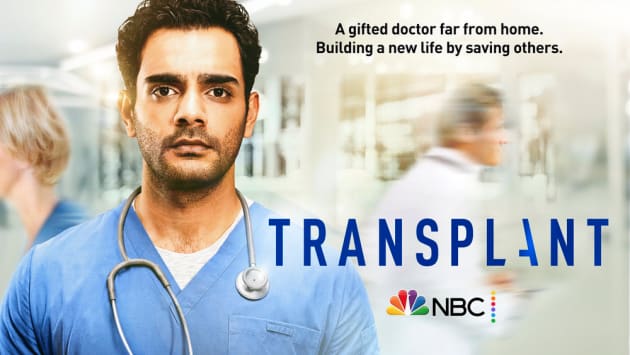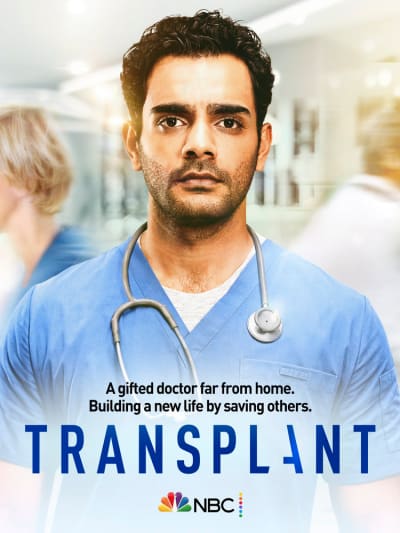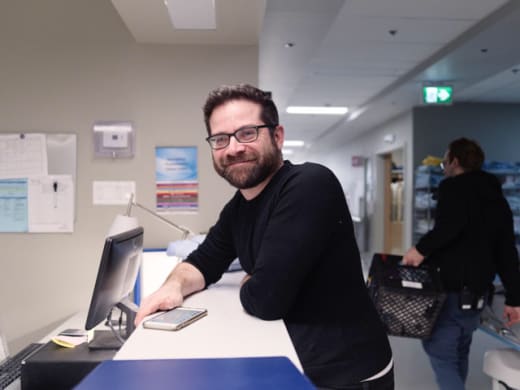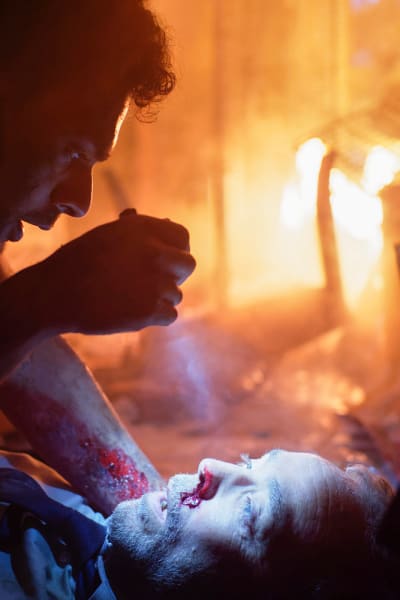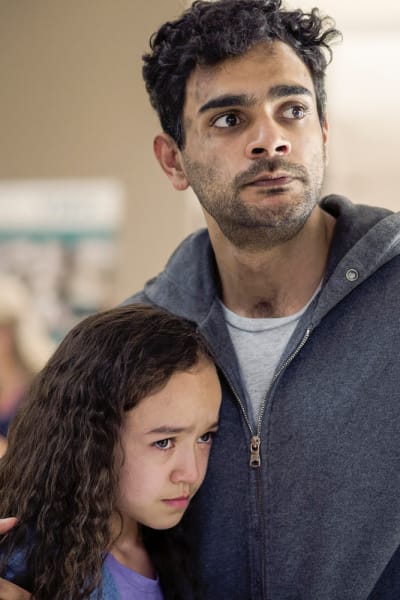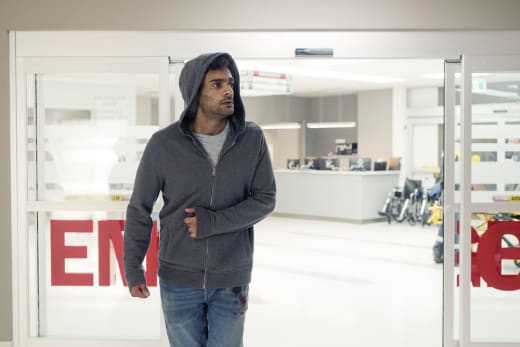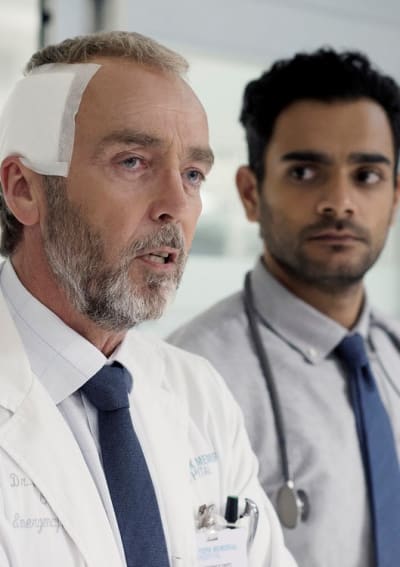In anticipation of NBC’s new Canadian import, Transplant, premiering on the US network on Tuesday, September 1, we had a chance to talk with the show’s creator and showrunner.
Joseph Kay is the last person you’d expect to write a medical show once you discover his history.
Once a practicing lawyer, it wasn’t until he had some time on the job under his belt that he realized his true love wasn’t in the profession, but with the academia, which he found intellectual and fun.
Using his spare time to write, he began writing film scripts. “On the strength of those,” Kay told us, “I went to a film school in Toronto called the Canadian Film Center, which is a small but sort of prestigious film school in Toronto, and then while I was there I got a job on a television show, a Canadian television show and so I made the transition that way.”
The legal profession hasn’t eluded Kay entirely with his foray into television, though, as he did some work on a Canadian legal drama titled This Is Wonderland. Canada doesn’t share the US fascination with legal dramas, but some of Kay’s favorite shows include The Good Wife, The Good Fight, and Better Call Saul.
So, while Transplant isn’t a legal drama, what Kay learned from his favorites of the genre is how to write characters. In addition to those shows, Kay dug into the archives to revisit some great medical shows for inspiration, too.
“I’m a big fan of the space, and I like all of them, or many, many of them, but for me, ER is the wheelhouse, you know, and I had been super into it when it was on.
Then when I was working on this show, I went back, and I rewatched the first three or four seasons of ER, and I honestly can’t believe how well it holds up, how completely and totally timeless it is in the way that it’s very grounded and economical in its storytelling.”
Rewatching ER made Kay realize how post-Grey’s Anatomy, the genre began to get soapier. He’s not arguing that ER might not have done the same in its later seasons but that in its earlier seasons, the show was mindblowing, “extremely emotional and extremely powerful but not manipulative,” which he found very inspiring.
Transplant starts as one man’s story, and because of that, he also views The Good Doctor as a successful show to emulate in the way the story unfolds from one man’s journey to an ensemble piece. Transplant follows much of the same trajectory.
“What I really wanted was to start with one person’s view and to gradually widen that lens every episode over the course of the first season.” He wanted the lead, Bashir, the be the sun around which everything else orbits and to deliberately widen.
To try to do that, Kay says, you need to establish the other characters as almost archetypes so that viewers feel connected to them quickly. Once that occurs, each is gradually given a larger arc creating a true ensemble.
Transplant focuses on a talented medical resident unable to resume his career in Canada after escaping the atrocities, his people were suffering in Syria. Kay first had the idea for Transplant around 2017, after the US election, during which time the idea of immigration was heavy in the air.
It was similar in Canada, but with a slightly different slant. “There was a lot written about the Syrian crisis because there were a lot of refugees from Syria coming to Toronto,” Kay said.
“I had wanted to develop a medical drama with a producer that I worked with here in Toronto, and I had been reading up about medical residence, and I wound up learning that if you are an international medical graduate and you want to do your residency in Canada, that it’s actually like unbelievably difficult to get a job.”
“It’s like you pretty much have to have gone to med school in Canada or the States, and if you haven’t, it’s really impossible for these foreign-trained doctors, who might be highly skilled. They very rarely will get a shot at their residencies, and when they do, it’s very onerous. I just combined the two.
“It just occurred to me; I was interested in something relating to immigration at the time and wanted to write a medical drama, and when I started reading about that plight, it occurred to me to combine the two, and then the idea of the main character of the show was born in my mind, and I took it from there.”
And while the themes might sound heavy, don’t worry too much over the politics involved. That’s not the point of the show.
“We’re not a political show. It’s meant as entertainment, and all we strive to do is tell an emotionally grounded, honest portrayal of one guy trying to start his life over, and I hope in that way, all we do is invite a certain amount of empathy for his experience, and that’s it; that’s as far as it goes. “
Still, Kay is grateful for the success he’s had in Canada and hopes Transplant is similarly received in the United States. “You never know how people are going to come to things, and we were fortunate; we had a very warm reception in Canada and big audiences, so I’m curious to see what’s going to happen in the US.
“I think that it probably wouldn’t be being broadcast, especially in fall in prime time, if NBC wasn’t optimistic about that,” Kay said.
Kay has taken at least one of the stories on Transplant from a Syrian doctor who consulted on the show. Bashir’s troubles resuming his career come down to the fact he cannot get his credentials from schools or hospitals in his home country.
Kay’s consultant was a Syrian doctor who had lived that experience. “Because if he had to leave his country during the crisis and was on the other side of the regime, and they wouldn’t let him have his credentials? What are you going to do? It’s a very real concern.”
Kay had worked with the Transplant’s lead, Hamza Haq, on another show, and they hit it off as friends. “I would have conversations about him on that show, about but his character on that show, about the face and background of that character, and when I started developing Transplant, I immediately thought of Hamza.
“He is, I think, a star. He’s an absolutely incredible actor. He’s able to convey vulnerability and empathy wordlessly, which is what I always wanted from the character, and I had always thought of him for it for that reason. He’s very expressive and really capable of nuance.”
Kay has wonderful things to say about his entire cast. ” The next person is Laurence Leboeuf, who is a really, really well-known actor in Canada, particularly in Quebec. She was a no brainer for that part. She was really funny, she plays Mag. Very dynamic actor.
The next was John Hannah, who we’re really lucky to get. He’s a veteran character actor who anchors the show. John’s amazing and, with his wit and intelligence and hilarity and a certain kind of grit. We mostly had those three.
“It went from there, and then you do the thing that you’re always doing when you’re casting. The first season of something you’re going on your gut, you know, trying to use your gut and get as close as you can to what everybody’s idea of the characters are, and I think we did a pretty good job there.”
Representation and inclusion were very important to Kay, even beyond Bashir and his sister, who are Syrian. His hope was to reflect the diversity normally seen in a Toronto hospital. In addition to the cast, Kay wanted, “issues of representation to be introduced gradually over the show and not hit audiences over the head with them.”
There is a broader conversation about that right now, and Kay hopes to do it justice. “I do hope to play a meaningful part in that conversation with this guy who is only trying to find a better life for himself. And by striving to tell that story in an emotionally honest way, what I hope is that we invite empathy for his lived experience.”
As a big believer in the universality of the specific, by telling the story through Bashir, Kay hopes it is a platform to explore themes of adaptation, assimilation, and starting over, themes that are universal in scope.
Transplant was such a Canadian success story that a second season has already been ordered. “The first season ends with a bang,” Kay teased and hopes that they can continue to surprise themselves with their storytelling.
Transplant premieres on NBC at 10/9c on Tuesday, September 1. We’ll be covering the whole season with episodic reviews, so be sure to tune in and return to TV Fanatic for more coverage.
We also have an exclusive sneak peek at the premiere right now, showing Bashir as he first enters the hospital, coming into its orbit after a shocking accident forced him to put his medical skills into action. Take a look!
Carissa Pavlica is the managing editor and a staff writer and critic for TV Fanatic. She’s a member of the Critic’s Choice Association, enjoys mentoring writers, cats, and passionately discussing the nuances of television and film. Follow her on Twitter and email her here at TV Fanatic.
